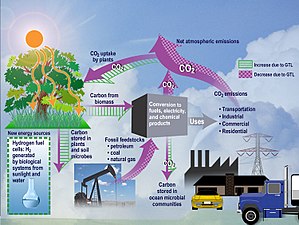Szerkesztő:Yaraclen/Earth System Science

Earth system science (ESS, kb. a Föld, mint rendszer tudománya) a systems science (kb. rendszertudomány) alkalmazása a Föld..[1][2][3][4] E rendszer mindegyik része között kapcsolat áll fennm ezek a részek: légkör, hidroszféra (víz), krioszféra (jég), geoszféra (a Föld belsejének részei), pedogszféra (talaj), bioszféra (élő szervezetek jelenléte) és a magnetoszféra (a Földet körülvevő mágneses erőtér). [5] [6] [7]—, kiegésztve az emberrel, mint ezekre a szférákra ható tényezővel. [8] At its broadest scale, Earth system science brings together researchers across both the natural and social sciences, from fields including ecology, economics, geology, glaciology, meteorology, oceanography, paleontology, sociology, and space science.[9] Like the broader subject of systems science, Earth system science assumes a holistic view of the dynamic interaction between the Earth's spheres and their many constituent subsystems, the resulting organization and time evolution of these systems, and their stability or instability.[10][11][12] Subsets of Earth system science include systems geology[13][14] and systems ecology,[15] and many aspects of Earth system science are fundamental to the subjects of physical geography[16][17] and climate science.[18]
- ↑ Stanley, Steven M.. Earth System History. Macmillan (2005)
- ↑ Earth System Science, From Biogeochemical Cycles to Global Changes, 2nd, London: Elsevier Academic Press (2000. január 3.). ISBN 978-0123793706. Hozzáférés ideje: 2015. szeptember 7.
- ↑ The Earth System (2nd edition). New Jersey: Prentice Hall (2004. január 3.). ISBN 0-13-142059-3
- ↑ Dynamic Earth. Jones & Bartlett Learning (2014)
- ↑ Cryospheric Systems: Glaciers and Permafrost. Geological Society of London (2005)
- ↑ Cockell, Charles. An Introduction to the Earth-Life System. Cambridge University Press
- ↑ Magnetospheric Current Systems. American Geophysical Union (2000)
- ↑ Earth System Science in the Anthropocene: Emerging Issues and Problems. Springer Science+Business Media (2006)
- ↑ Butz, Stephen D.. Science of Earth Systems. Thomson Learning (2004)
- ↑ Hergarten, Stefan. Self-Organized Criticality in Earth Systems. Springer-Verlag (2002)
- ↑ Nonlinear Dynamics in Geosciences. Springer Science+Business Media (2007)
- ↑ Dynamics of Multiscale Earth Systems. Springer (2003)
- ↑ Environmental Geology: An Earth System Science Approach. W. H. Freeman (1998)
- ↑ Martin, Ronald. Earth's Evolving Systems: The History of Planet Earth. Jones & Bartlett Learning (2011)
- ↑ Wilkinson, David M.. Fundamental Processes in Ecology: An Earth Systems Approach. Oxford University Press (2006)
- ↑ Physical Geography, 1999–2015
- ↑ Physical Geography: Great Systems and Global Environments. Cambridege University Press (2013)
- ↑ Understanding the Earth System: Global Change Science for Application. Cambridge University Press (2012)
